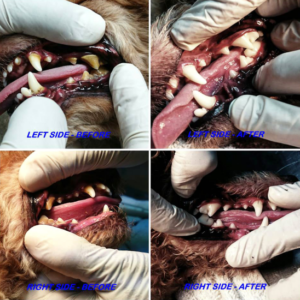Idiomatic expressions may tell us that a dog’s bark is worse than its bite; however veterinary science shows that its breath is more portentous. Even the most loving of pet parents can dismiss a dog’s not-so-sweet smelling scent as typical eau de chien―after all, ‘dog breath’ is a term commonly used to describe a malodorous mouth―but it could very well be a sign of poor oral health.

“Pet owners don’t take dental health seriously,” says Dr. Esteban Aldrin Bisa, veterinarian and proud owner of two Rhodesian Ridgebacks, four border collies, two toy poodles, a Shetland sheepdog, a German shorthaired pointer, and a Persian cat. “Dental health is very important. Prevention of periodontal diseases can also prevent more serious damage to the liver, kidney, and heart, which could be life-threatening.”
According to the American Health Veterinary Dental College, periodontal disease is the most common medical condition found in adult dogs. Statistics for the Philippines are not readily available, but if the state of dental health among Filipinos is any indicator, then suffice it to say that our dogs’ canines are in as much need of care as our own. In any case, Dr. Bisa notes that his practice, JurisVet Pet Emergency Clinic in Lipa City, Batangas, has admitted many a patient exhibiting symptoms of periodontal disease, such as plaque, tartar, gingival regression, fractures and cracks, loose teeth, and halitosis. “Halitosis a common sign of poor dental health, especially if it is accompanied by loss of appetite or difficulty eating,” say Dr. Bisa.
Halitosis in dogs―as with humans―most often occurs when bacteria form plaque, a sticky substance that hardens into tartar on the surface of the teeth. In more severe cases, plaque and tartar build up below the gumline, leading to damage in the tooth and surrounding tissues.
Dr. Bisa notes that gum infection can lead to bacteremia, or the presence of bacteria in the blood. If a bacterial infection enters the bloodstream, this may progress to sepsis, which can block oxygen from reaching vital organs and ultimately lead to organ failure. “Other consequences of periodontal disease include tracheobronchitis and certain joint diseases.”
While periodontal disease and its potential side-effects sound serious, the good news is that much of this can be avoided by instituting a regular oral care routine for your Bisadog. “Daily brushing is important. This minimizes plaque build up and massages the gingiva (gums), so it is best that pets are trained as early as possible for them to accept this regular procedure,” says Dr. Bisa.
While he recommends using an enzymatic toothpaste formulated specifically for dogs, he finds that the bristles of pet toothbrushes are too soft, and advises that you use a children’s toothbrush instead. “There are also dental treats or food that can be given daily. Chew toys and raw hides can help prevent plaque.”
Another advantage to daily brushing is that pet owners are able to regularly observe the condition of their dog’s teeth and mouth; this makes it easier to detect problems, which should be reported to their veterinarian at the soonest possible time and not just during their scheduled check-up and annual prophylaxis.
An ounce of prevention is worth a pound of cure. The more time and care you spend on your dog’s teeth at home means less expense and worry at the vet clinic.
This story appeared in Animal Scene’s April 2015 issue.






